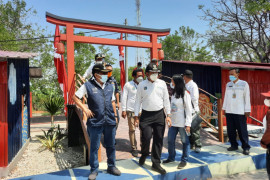The Perbekel or Village Chief of Batubulan Village, Dewa Gede Sumertha, said that based upon documents from 1937 in the local archive, Tari Barong performances have been a source of entertainment for travelers from the Netherlands passing one of the temples in Batubulan for some 30 decades.
“Since then, our village has been known for its culture,” said Sumertha.
The village, located about nine kilometers from Denpasar, has five stages spread across the village, which holds Tari Barong performances every day. One stage that always attracts large audiences is found in front of the Puseh Temple in Batubulan.
Beginning in the 1960’s, Barong performances were used to attract tourists to the area.
Currently, some 125 tourists, both domestic and international, attend Tari Barong performances each day.
International tourist pay 10 US dollar to watch the performances, while domestic tourists often have package deals with their travel agencies that include attending the dances.
Sumertha added that the Tari Barong performances help boost the economic sector for Batubulan residents.
In 2012, Batubulan village was awarded the National Champion in Tourism Awareness Group.
Batubulan has 22,754 inhabitants. In 2019 the village received village funds of some 5.77 billion rupiah.
The village budget is divided up, using 40 percent for community development, 36 percent for governmental usage, 20 percent for village development, 3.8 percent for empowerment, and the remainder for disaster relief and emergencies.
In the health sector, Batubulan organized Gerakan Masyarakat Pemberantasan Sarang Nyamuk (The Campaign to Eradicate Dengue/Geram PSN) in April 2016. The campaign was driven by three PSN cadets from 18 community groups.
“The cadets not only monitor mosquito’s larvae, but are also equipped with knowledge to educate people about how to maintain environmental sanitation,” said Sumertha.
Village funds were also used to support 20 Community Healthcare Centres by providing supplementary food for babies, to prevent stunting in children.
Additionally, village funds are used for road construction in Batubulan.
Reporter: Ni Luh R/Gusti NC Aryani
Editor: Bambang Purwanto
Copyright © ANTARA 2019












